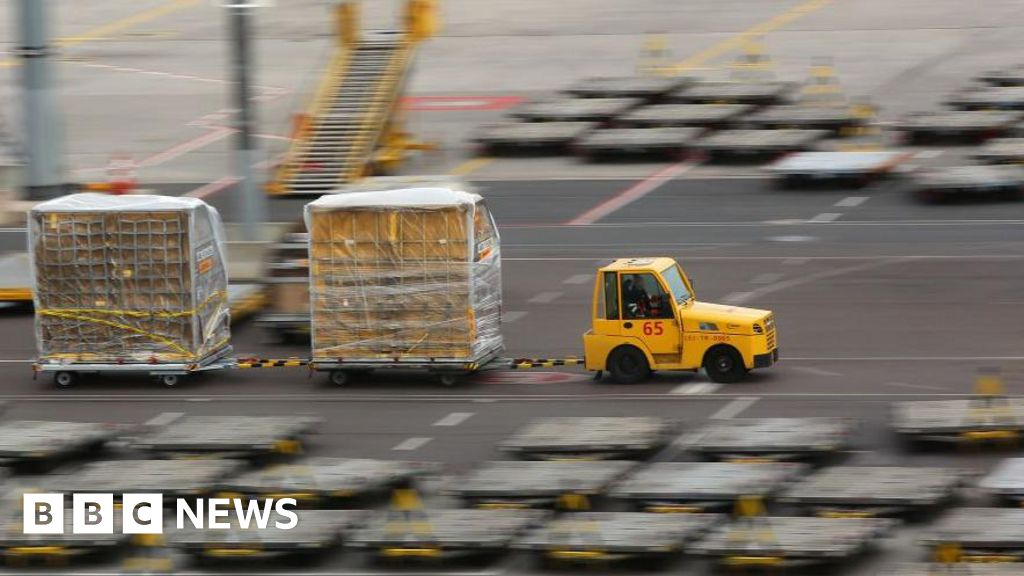 Getty Images
Getty ImagesA series of package fires targeting couriers in Poland, Germany and the UK were a dry run aimed at disrupting flights to the United States and Canada, Polish prosecutors said.
Katarzyna Karow-Jaszewska revealed late last month that four people had been arrested and that authorities across Europe were investigating the incident.
Western security officials have now told US media they believe the July fire was part of an orchestrated operation by Russia’s military intelligence agency, the GRU.
Russia denies being behind the sabotage. But it is suspected that the attack was behind other attacks on warehouses and rail networks in EU countries including Sweden and the Czech Republic this year.
Ms. Callow Jaszewska said in a statement that a group of foreign intelligence saboteurs was involved in sending packages containing hidden explosives and dangerous materials through courier companies. The parcel then spontaneously ignited or exploded.
Western authorities believe the cause of the fire was an electric massage machine containing a “magnesium-based” substance.
Magnesium-based fires are difficult to extinguish, especially on airplanes.
“The group’s goal was also to test the route of the package, which was ultimately destined for the United States and Canada,” said Callow-Jaszewska.
Some of the devices originated in Lithuania, where prosecutor general Nida Grunskine said arrests had also been made. A pretrial investigation is underway and law enforcement agencies from other countries are also participating, she told reporters.
Over three days in July, fires broke out at a container scheduled to be loaded onto a DHL cargo plane in the German city of Leipzig, at a shipping company near Warsaw, and at Minworth, near Birmingham, England, with packages described as “on fire.” Incendiary device.
According to Polish media reports, the fire in Zablonow, near Warsaw, took two hours to be extinguished.
British authorities have released few details about the fire that broke out on Midpoint Way in Minworth on July 22nd. A Metropolitan Police spokesperson confirmed a counter-terrorism investigation was underway after a package went up in flames at a commercial property, adding: “Staff and local fire services responded.”
Ken McCallum, head of Britain’s domestic intelligence agency MI5, said last month that Russian secret agents had carried out “arson, sabotage and other dangerous acts carried out with increasing recklessness” after Britain supported Ukraine in Russia’s war. said. His claims were flatly rejected by the Kremlin.
It is important to distinguish between known facts and suspicions and suspicions raised by Western officials.
There is no doubt that this year there have been a series of suspicious fires in cargo warehouses in the UK, Germany and Poland. This is suspicious enough to trigger an investigation by counterterrorism police.
In other cases across Europe, a man was convicted at the Old Bailey last month under new national security laws for arson of a Ukrainian-run business in Leyton, east London, in March. It was given down.
In Germany, the head of the domestic intelligence service (BfV) said it was just luck that the Leipzig device did not ignite in midair.
BfV Chairman Thomas Haldenwang said Russian sabotage was suspected in the equipment that caught fire at DHL’s logistics hub at Leipzig-Halle Airport.
Taken together, these events have led Western governments to conclude that Russia’s military intelligence agency, the GRU, has likely launched a coordinated campaign of anonymous covert attacks against countries supporting Ukraine.
The luggage that went up in flames in Leipzig appears to have arrived from Lithuania, and the flight there was delayed.
The device that ignited in Minworth is also understood to have come from Lithuania, and parliament’s national security and defense committee chairman Arvidas Pokius said it was a “current attack designed to cause confusion, panic and chaos.” It’s part of an ongoing hybrid attack campaign.” distrust”.
Since the recent cargo fire, DHL has increased security. A spokesperson said a few weeks ago: “DHL Express is taking steps to protect our network, our employees and equipment, and our customers’ shipments in all European countries.”
The Polish government has already responded to allegations of Russian sabotage, with Foreign Minister Radosław Sikorski announcing the closure of the Russian consulate in Poznań and threatening to expel the Russian ambassador if the attacks are not stopped.
Russia’s Foreign Ministry condemned the move as a “hostile measure with painful reactions.”




